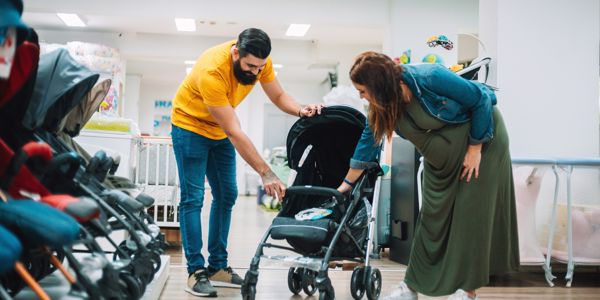The way in which you speak to your child in the first three years of life is extremely important. The more words your child hears in the first three years, the more likely it is that they’ll have a larger vocabulary later in childhood.
In fact, infant researchers found that the number of words a child hears in the first three years of life was a better predictor for the size of the child’s vocabulary at age 11 than any other factor that was studied, including the parents’ IQs, the family’s socioeconomic status, or the school that the child attended.
It’s important to know that you will talk differently to your baby as her or his language skills improve. With a newborn baby, it is helpful to repeat the same words thousands of times over the first few months of life. Once your baby understands at least 50 words, then your baby will likely be learning words at a much faster pace. At this stage, instead of repeating many words thousands of times, it is much better to begin introducing many new words each day.
Use Parentese With Your Newborn
Parentese means speaking in a higher-pitched voice, elongating the vowel sounds, and slightly over-enunciating words. Babies prefer higher-pitched voices, and by over-enunciating, you’ll make it easier for your baby to differentiate spoken words.
I suggest using mostly parentese until your baby is around 6 months of age, then gradually use less parentese. Once your baby understands at least 100 words, then it may be better to speak in a more normal voice most of the time.
Describe Your Baby’s Senses
It’s great to talk about all of your child’s senses with them. Narrate or describe what your child is seeing, hearing, smelling, tasting, and touching as it's happening. Think of movement as a sense as well, and describe how your child is moving. You should try to do this as much as you can throughout the day, and bond with your baby while helping her learn language skills.
Isolate an Individual Word, then Use the Word in a Sentence
If you talk at a normal speed, the sound of one word often flows into the next, making it difficult for infants to figure out that individual words exist. You can help them to learn vocabulary at a faster rate by saying an individual word, then showing or demonstrating the meaning of the word.
Next, use the same isolated word in a sentence. This can not only help your baby learn the meaning of the word, but your baby learns grammar from listening to sentences. Research shows that babies typically figure out some syntax by 12 months of age.
Make Language Multisensory
It’s also great to let language learning be multisensory for your little one. Instead of simply talking to your baby (where your baby only hears language), consider adding written language so they see and hear words and see and hear the meanings of the words at the same time.
For example, allow your baby to see and hear the word “hand”, then touch one of your baby’s hands and say “hand” again at that precise moment. New brain connections will be formed during this experience, and the more precisely you match the sensory word to the action, the easier it will be for your baby to figure out the relationship between what you are saying and what the words mean.
Describe Body Parts and Actions in Front of a Mirror
Playing in front of a mirror and teaching body parts, talking about what you’re doing, and carrying out actions with your little one can be great for their development. Ideally, have a mirror in a convenient location in the home so you can do this as you go about daily tasks.
Name Objects in Your Home
Naming and describing objects around the home can entertain your little ones for hours. You can also simply name each object and describe how it is used or, its most important features.
Take Advantage of Opportunities to Teach New Words
When you’re shopping, taking walks, travelling, or playing with your baby, take all the opportunities you can to name new things to them. Travelling is a great opportunity for this because you often see objects or actions that you may not see at home.
Use Synonyms
Once your child understands the meaning of a word, it’s the perfect time to start introducing synonyms. For example, if your baby understands the word ”little," then instead of saying the word little you could say small, tiny, wee, minuscule, petite, minute, diminutive, slight, and so on.
Illustrate Opposites
Using your voice to show the meaning of the words can be a great way to teach opposites. For example, say “high” while using a higher-pitched voice and moving an object up high, then say “low” while using a lower-pitched voice and moving the object down low.
Teach Written Language Earlier
Reading to a child typically helps the child’s vocabulary, but you can use some books to teach reading skills early on. Early readers will be able to read on their own and have the opportunity to help expand their vocabularies at a faster rate. I have written about this in great detail, but I just want to stress that most books are not designed for teaching reading.
Some research shows that with typical books, the average 4 or 5 year-old only focuses on text about 5 seconds per book.
Dr Robert Titzer is a speaker at The Baby Show, find out more about their upcoming events here!
References
Ambridge, B., Kidd, E. Rowland, C. F., & Theakston, A. L., (2015). The ubiquity of frequency effects in first
language acquisition. Journal of Child Language, 42, pp 239-273.
Evans, M. A. & Saint-Aubin, J. (2005). What Children Are Looking at During Shared Storybook Reading
Evidence From Eye Movement Monitoring. Psychological Science, 16(11), 913-920.
Hart, B., & Risley, T. R. (1995). Meaningful differences in the everyday experience of young American children. Paul H Brookes Publishing.
Smith, L.B. (2000). Learning how to learn words: An associative crane. In R.M. Golinkoff, et al. (Eds.),
Becoming a Word Learner: A Debate on Lexical Acquisition. New York: Oxford University Press.




